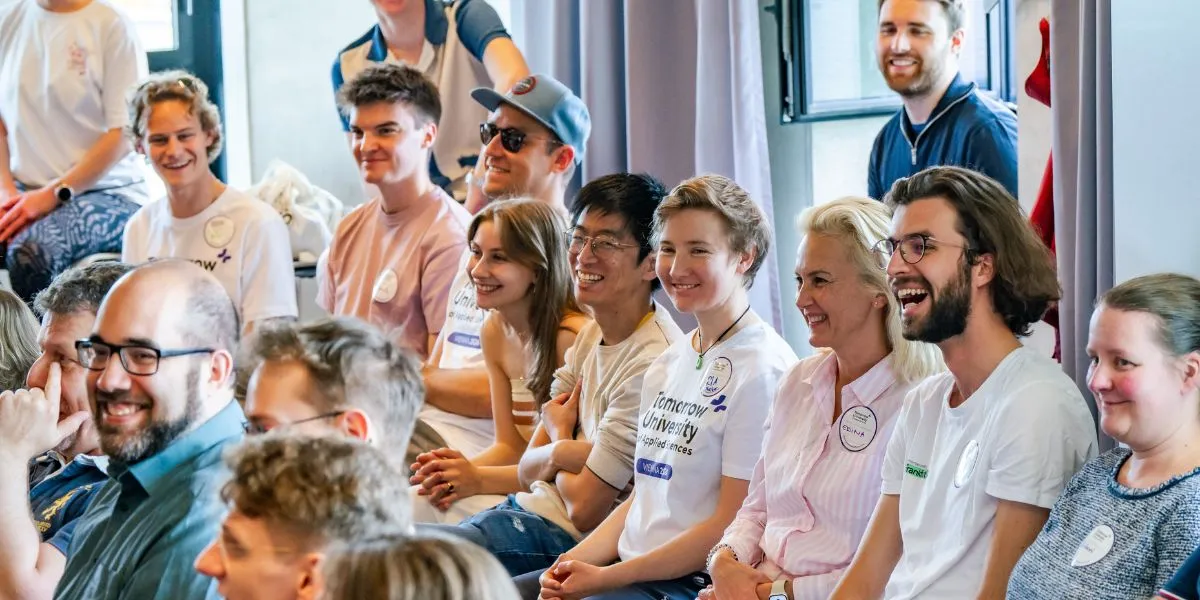Interview: Building Impactful Ventures With Purpose
How do you lead with purpose in a fast-paced world? In this interview, a Tomorrow University learner shares their entrepreneurial journey—building ventures with heart, innovation, and a deep sense of impact. A conversation on values, resilience, and the future of purposeful business.
.webp)
Impactful entrepreneurship, an interview with CEO Dr. Thomas Funke.
Thomas talks about what it means to be an impactful entrepreneur and shares his mission toward a more sustainable future.
Interview by PM in SET Learner Eilecia Bovard
As a part of our Professional Master’s Degree program in Sustainability, Entrepreneurship, and Technology we are asked to interview entrepreneurs that have made a positive impact on our lives over the past year and naturally thought of ToUs very own, Thomas. As a leader at the forefront of redesigning how we approach higher learning, it was a story I was eager to share. The following are highlights from my interview with Dr. Thomas Funke.
Thomas is an academic and entrepreneur, as well as Co-Founder & CEO of Tomorrow University of Applied Sciences. The following interview offers insight into Thomas’ thoughts about what is important to develop in oneself to become a change maker and where he sees the potential opportunities for innovation now and in the future.
Eilecia: I am curious to know who would you interview that is still alive today and why?
Thomas: Not to say that I am a huge fan of his but still, Elon Musk. Just to see how he is in person and understand what kind of mindset led him to create the things that he has created. He must be a brilliant guy and on the other hand a total maniac. Perhaps this is true for all great entrepreneurs, to understand how they did it, what made them the way that they are, and if there are certain patterns in order to build something big. I would add the founders of Patagonia with their unique branding style. Additionally, although not necessarily entrepreneurs yet inspiring people, Michelle Obama, Angela Merkel, and Leonardo Dicaprio for his sustainability activism. As well as the incredible scientists and researchers of the natural sciences — many people.
Eilecia: How has the fulfillment of your own inspirational reach coming along?
Thomas: Well, we have tried to get in contact with Elon, John Doerr, and Bill Gates however we haven’t heard back yet. This desire to connect to mentors started in my childhood, as I was a big soccer fan and always wished to get close to the great players. When I was 16, a friend somehow managed and brought me to meet and talk to some of them. I believe it’s always possible to make contact with those that have inspired us.
Eilecia: What is meaningful in life to you?
Thomas: Many things! Although I have my rule of three which makes things easier. The first is to be autonomous. For me, it’s important that I can be who I am without restrictions and that I can work from what makes sense to me. This is perhaps why I don’t fit into the corporate world. The second is that I can have an impact by learning and creating. Lastly, I need relationships, community, and family so that I am able to contribute to others. Whatever I do, it has to be in relation to others. Perhaps I could say I prefer to be autonomous while embedded in a community.
EIlecia: What did it take to leave an old system, let’s say the University setting, to forge a new system, for example with the starting of ToU?
Thomas: The most important thing needed, for me, was self-esteem and confidence. Often we think of the worst case but that’s absolutely not a realistic case. Realistically, you usually fall somewhere between worst and best-case scenarios. You have to first believe in yourself before you can create and believe in a certain thing. For me, that has been the biggest learning.
Eilecia: How did you overcome that self-doubt?
Thomas: This was not overnight. I found reassurance in what I know I have achieved in the past. I would say to myself, I have done some cool things before so why shouldn’t it work now? Also, a feeling of self-efficacy and knowing what I can and cannot do. In many things I am not good however I can build upon my strengths and learn more about what I don’t know. I will add that outside influence was important too. It was clear that I have to act; if I failed individually, that was fine. I find strength in knowing that I tried to change something for the greater good. I have learned that stepping back, being less self-centered, and focusing on society and the planet are more important than what happens to me. This is a major motivating factor.
EIlecia: Where do you experience a world that is dying/ending and a world that is waiting to be born/beginning?
Thomas: There are many worlds that I see dying and many that I see beginning! Although it’s in the initial steps, I see the traditional economy dying. I wonder what of that economy will survive and what will not. For example, in the way we do business and approach education. Historically, education had two primary functions, to ensure everybody gets a job and that society would advance. What has never been considered was at what cost? The type of education that we offered has caused a lot of the trouble that we are in. I see this notion of education dying as it’s no longer about creating and being employed. I also see in education the birth of something new. In addition to ToU, there are many new approaches to understanding how to learn, how to live together, and how to see work. Also, how we worked is also dying. There is a new birth of how we work individually and together and how we use technology.
Regarding biodiversity laws and climate change, a lot of people are saying that it’s already too late but I don’t think it is, let’s create things! We have to use the tools that we have built to create positive change.
I believe going forward we will see a lot more people believing in themselves and with their actions and a strong sense of self we will see great change and impact. I see that world coming. I hope that eventually there will be 8 billion people out there driving change and it can start with a smile.
Eilecia: Is there anything that you would like to add?
Thomas: Shifting mindsets is what we need to do. We need to create more awareness, as many don’t have access to information or fully understand the change that is occurring. Awareness through positive messaging and reinforcement will be very important. I think the biggest mindset shifts come from inspiring people positively. We definitely need more optimists.

.svg)
.svg)
.svg)



.webp)




.webp)
